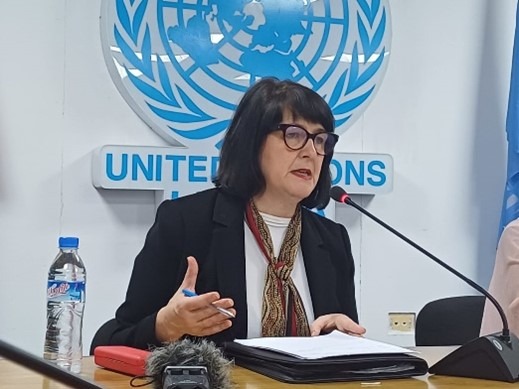The United Nations Special Rapporteur on trafficking in persons, Siobhán Mullally, following a 10-day visit to Liberia, has issued a stark warning: the country must prioritize the prevention of human trafficking, particularly of women and girls, within its development agenda. Mullally’s assessment highlights the urgency of integrating anti-trafficking measures into Liberia’s national development plans, including the forthcoming National Action Plan to combat trafficking in persons, the National Development Plan, and the United Nations Sustainable Development Cooperation Framework. She emphasizes that this is a critical juncture for Liberia, offering a unique opportunity to strengthen child protection and promote gender equality across all sectors, including justice, child protection, labor, and health. The Special Rapporteur’s call to action stems from the recognition that despite efforts to combat trafficking, significant challenges remain. These challenges are exacerbated by Liberia’s history of civil war and political instability, which, coupled with widespread poverty and weak law enforcement, creates an environment ripe for exploitation.
Mullally’s investigation revealed a sobering reality: human trafficking is deeply entrenched in Liberia, with women and children bearing the brunt of this horrific crime. They are often forced into various forms of labor exploitation, including domestic servitude, agricultural work, and dangerous illicit mining operations. Furthermore, many are subjected to sexual exploitation within both local and regional trafficking networks. Though Liberia has made strides in strengthening its legal framework to combat trafficking, enforcement remains a significant hurdle due to limited resources, corruption, and a lack of specialized training for law enforcement personnel. The scarcity of victim assistance services, particularly in rural areas, further compounds the problem, leaving survivors facing immense challenges in their pursuit of reintegration and protection.
The Special Rapporteur underscored the urgent need for comprehensive interventions that go beyond law enforcement. She advocates for a holistic approach that encompasses robust social services, enhanced protection for vulnerable communities, and the creation of economic opportunities to reduce susceptibility to exploitation. Mullally highlights the severe limitations in assistance and protection services available to trafficking victims, especially in rural areas and border crossings, where many fall prey to traffickers. She calls for an expansion of safe housing options and strengthened child protection measures, particularly for women and girls in precarious situations, such as those living in mining and concession areas or on the streets.
Community-led anti-trafficking initiatives, developed in close consultation with affected groups, including persons with disabilities, are also crucial, according to Mullally. She stressed that victims’ lived experiences must inform the design and implementation of anti-trafficking responses. This victim-centered approach ensures the provision of accessible and effective assistance and protection services for all survivors. Mullally’s observations pointed to specific sectors where trafficking risks are particularly high: domestic work, agriculture, and illicit mining, where women and girls are frequently subjected to both forced labor and sexual exploitation. She also raised concerns about the potential for trafficking within supply chains, including the fisheries sector, where inspection and enforcement capacities are currently inadequate.
To effectively combat trafficking, Mullally recommends enhanced coordination within Liberia’s national anti-trafficking task force and other relevant agencies. This includes increased technical and financial support, improved oversight mechanisms, and more robust labor inspections. While acknowledging the progress Liberia has made in its anti-corruption efforts, including the establishment of the Office of the War and Economic Crimes Court and the Liberia Anti-Corruption Commission, she emphasizes that holding traffickers accountable must remain a priority. Effective investigations and access to justice for victims are essential components of a comprehensive anti-trafficking strategy.
Finally, Mullally’s forthcoming report to the UN Human Rights Council in June 2025 will provide a detailed analysis of her findings and recommendations. This report will serve as a roadmap for Liberia to strengthen its response to human trafficking, enhance the protection of its most vulnerable populations, and ultimately dismantle the networks that perpetuate this egregious crime against humanity. The Special Rapporteur’s visit and subsequent report represent a critical opportunity for Liberia to take decisive action in the fight against human trafficking and secure a safer, more just future for all its citizens.














